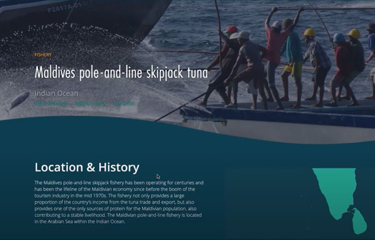The International Pole and Line Foundation (IPNLF) has launched its Sourcing Transparency Platform (STP), an online portal designed to increase transparency in the tuna supply chain.
The STP is exclusive to IPNLF member-companies and aims to improve transparency of pole-and-line, handline, and troll (collectively known as one-by-one) tuna supply chains through public disclosure. Current tools that promote these small-scale tuna fisheries are often too expensive, according to IPNLF. The organization’s aim is to promote these fisheries at no cost to help increase their market access, and to promote responsible business practices of companies and educate consumers on responsible, ethical tuna products.
“Purchasing tuna products that are responsibly and sustainably caught has powerful social and economic benefits, as well as protecting the health of marine ecosystems,” IPNLF Social Responsibility Director Zacari Edwards said in a press release. “This is why increased transparency throughout supply chains is crucial to empower both consumers and industry to make more responsible choices that benefit both the ocean and coastal communities. The STP is a unique tool in this sense as it makes the direct connection between products and the fisheries where the tuna has been sourced from, guiding more-responsible tuna-purchasing practices as a result.”
Many of the fisheries included on the platform are located in small-island developing states or least-developed countries. The STP aims to improve the transparency of these small-scale tuna fisheries to provide assurances to the marketplace of sustainability. According to the IPNLF, small-scale one-by-one tuna fisheries produce up to 50 times more labor per ton of tuna caught than industrial fishing, creating more equitable distribution of economic benefits and recirculates the wealth among coastal communities that depend on the fishing industry, which in turn, contributes to local food security, poverty alleviation, and secure livelihoods.
“When we talk about sustainable fisheries, it is this livelihood aspect that is often neglected and overlooked,” IPNLF Managing Director Martin Purves said. “The 2030 Agenda and its Sustainable Development Goals are focused on poverty alleviation, sustainable resource use and improved livelihoods for all. Holistic sustainability in tuna fisheries is therefore only possible if small-scale local fisheries are supported by retailers, brands, distributors, and processors. The STP provides the platform to champion these small-scale fisheries and their supply chains.”
The tuna fisheries featured on STP will have a profile that includes their fishing methods in use, location, history, fleet capacity, and relevant management measures in place. The platform is an educational tool to inform consumers directly about where their tuna comes from and allows them to search their local area or region for one-by-one tuna products.
STP also allows companies to create profiles that present their one-by-one tuna products. The platform connects those products to their original fisheries to show where the raw material is sourced from as well as additional information such as policies and commitments of the companies. Responsible retailers that use the STP include M&S and Sainsbury’s in the UK, Whole Foods in the U.S., Edeka in Germany, Migros in Switzerland, and Woolworths in South Africa. Beyond sourcing transparency, the STP also allows these companies to feature their alignment with global initiatives such as the U.N. Sustainable Development Goals.
“We aim to create a conversation from B2B and from company-to-customer,” IPNLF Communications and Marketing Director Philippine Wouters said. “Each company has populated their page with information to give in-depth insight into their sustainable operations. This enables transparency that is vital for creating conversations around how we should be sourcing and consuming tuna to be responsible, ethical, and truly support the coastal communities that we rely upon for our seafood. From a consumer perspective this platform helps the public understand the process behind their can, sushi, poké bowl, and steak and where to purchase responsible tuna products in a way that safeguards the ocean for today, and for the future.”
Screenshot courtesy of IPNLF






